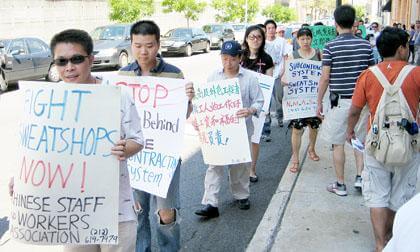By Jeremy Walsh
A labor dispute between garment workers and a Long Island City manufacturer spilled onto the streets Tuesday as protesters claimed the company’s owners fired most of the staff in retaliation for a federal lawsuit filed by a few employees.
With assistance from the Chinese Staff & Workers’ Association and National Mobilization Against Sweat Shops, some of the fired workers joined about 100 employees from construction and janitorial companies nearby to protest in front of the manufacturing facility at 47-27 36th St. Some 60 of the facility’s 80 workers were let go at the end of last year.
An attorney for the company, Great Wall Corp., said the firings were not retribution but a reaction to the increased scrutiny the facility would face in the wake of the lawsuit.
“In good times, anything goes, but when there is a conflict, when it is brought under a microscope, you need to comply with the laws,” attorney Raymond Wong said. “If you let go some of the people that were illegal, somehow that’s retaliation?”
Brooklyn resident Hui Lin, 37, is one of the complainants listed on the suit filed Nov. 25, 2008, in Brooklyn federal court. She said she worked long hours, often as many as 100 a week, bringing in an income of between $300 and $1,000 depending on the going rate per garment made. But she said Great Wall’s owners, Ping Nen Lin and Xiao Yan Lin, would take as much as 5 percent of workers’ earnings and failed to pay any overtime.
When Hui Lin and five other workers filed the suit, she claims the owners blamed them in front of the other workers for shutting the factory down in December 2008.
“The boss tried to turn our workers away from us,” she said. Now she and her husband, who also worked at the factory, are unemployed.
“The area that I work in, it’s very hard to find a job,” she said.
The suit seeks compensation to match minimum wage, unpaid overtime wages for the nights workers spent in the factory on rush orders.
Wong said the workers were independent contractors, not hourly employees.
“In the very beginning in 2005, our client entered into an agreement with them that they were independent contractors,” he said, although he noted that a federal judge dismissed that argument earlier this year. “The court did not address that issue at all. That is shocking to me.”
Labor organizers pointed to the 2003 court decision Zheng v. Liberty Apparel, which widely expanded what constituted an employee within the garment industry, which typically relies on a complicated system of subcontractors to produce its goods.
The company’s owners also run the companies Great Rose Fashion Inc. and Silver Fashion Inc., which protest organizers said handled the hiring of subcontractors.
Reach reporter Jeremy Walsh by e-mail at jewalsh@cnglocal.com or by phone at 718-229-0300, Ext. 154.

































